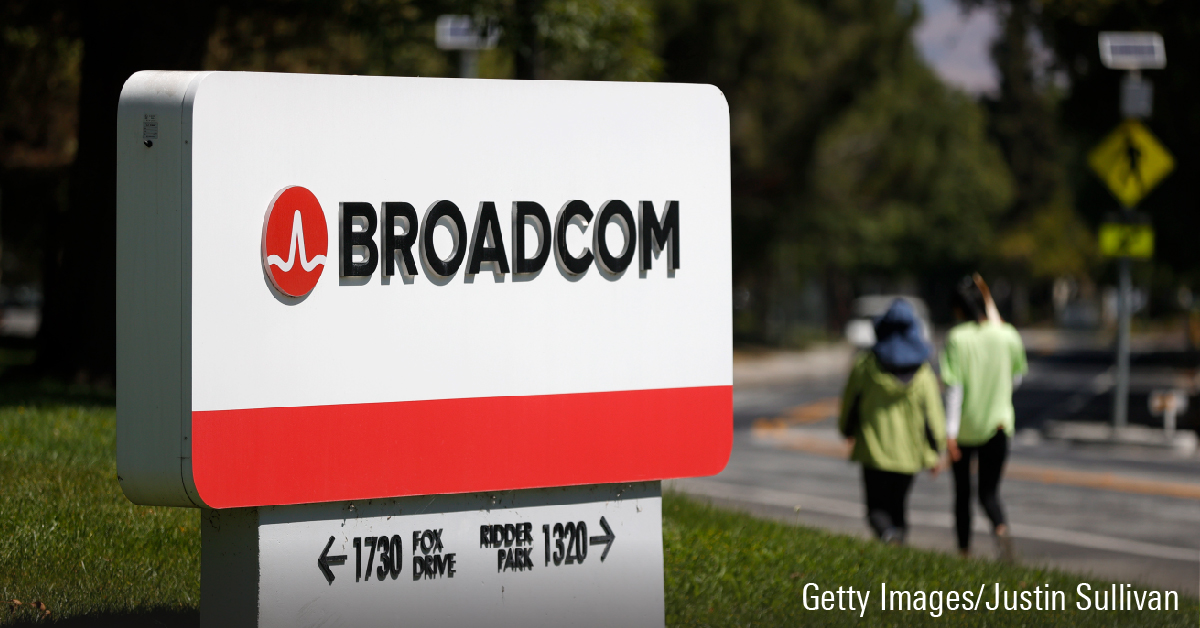After Earnings, Is Broadcom Stock a Buy, a Sell, or Fairly Valued?
With its rapidly growing chip sales and VMware integration, here’s what we think of Broadcom stock.

Broadcom AVGO released its second-quarter earnings report on Sept. 5. Here’s Morningstar’s take on Broadcom’s earnings and stock.
Key Morningstar Metrics for Broadcom
- Fair Value Estimate: $155.00
- Morningstar Rating: 3 stars
- Morningstar Economic Moat Rating: Wide
- Morningstar Uncertainty Rating: Medium
What We Thought of Broadcom’s Q2 Earnings
- We maintained our fair value estimate of $155 per share for Broadcom, as results and guidance met our expectations. The firm looks fairly valued to us.
- Broadcom’s artificial intelligence chip sales are growing rapidly, helping to offset weaker demand for some of its other chip product lines. We are very bullish on Broadcom’s AI opportunity, which is more than tripling this year. We expect AI chip sales to grow at an average rate of around 30% over the next five years.
- The firm’s integration of its large VMware acquisition is ahead of schedule, and we believe this deal will accelerate Broadcom’s software revenue growth and diversify its opportunity alongside its semiconductor business.
Broadcom Stock Price
Fair Value Estimate for Broadcom Stock
With its 3-star rating, we believe Broadcom’s stock is fairly valued compared with our long-term fair value estimate of $155 per share, which implies a fiscal 2024 adjusted price/ earnings multiple of 29 times and a fiscal 2024 enterprise value/sales multiple of 13 times.
In our view, Broadcom’s primary valuation drivers are the growth of its networking business and its ability to extract growth and operating leverage from VMware. We also anticipate continued inorganic growth over the long term. We model 22% revenue growth for Broadcom, including the inorganic contribution from VMware, through fiscal 2028. We see high artificial intelligence sales driving supernormal growth in the next five years, but for longer-term durable growth to settle in the high-single digits on an organic basis.
Read more about Broadcom’s fair value estimate.
Broadcom Stock vs. Morningstar Fair Value Estimate
Economic Moat Rating
We believe Broadcom has a wide moat, stemming from intangible assets in chip design and switching costs for its software products. The firm’s strength in both chips and software lets it earn terrific accounting and economic profits, and we believe its competitive positioning will likely allow it to do so for the next 20 years. Most of the company’s business is in semiconductors, with broad end-market exposure across enterprise networking, wireless chips for smartphones, broadband access, and storage applications. We see the two largest exposures here, networking and wireless chips, benefiting from the firm’s expertise in chip design.
Most of Broadcom’s business is in semiconductors, with broad end-market exposure across enterprise networking, wireless chips for smartphones, broadband access, and storage applications. We see the two largest exposures here—networking and wireless chips—benefiting from the firm’s wide-moat expertise in chip design.
Read more about Broadcom’s economic moat.
Financial Strength
We anticipate Broadcom focusing on strong cash generation. Over the short term, we expect the firm to focus on paying down the debt taken to acquire VMware. Over the long term, we expect it to focus on growing its dividend and bolting on more acquisitions. As of January 2024, Broadcom held $12 billion in cash and equivalents versus $76 billion in gross debt, with approximately half of that taken on to finance the 2023 acquisition of VMware. Given the long-dated nature of its outstanding notes and robust cash generation, we aren’t worried about the firm’s debt.
Management estimates its gross debt/adjusted EBITDA ratio to rise to 3.5 times after closing, and it targets 2.5 times within two years of closing. We expect the firm to easily achieve this target, given its success in deleveraging from prior (albeit smaller) acquisitions. Further, Broadcom has committed to its dividend policy—50% of the prior year’s free cash flow—after closing the acquisition. Broadcom consistently generates free cash flow margins above 40%, which we expect to continue. Over the last five years, it’s averaged $14 billion in cash flow annually. In the future, we project this number to jump past $30 billion with VMware in tow.
Read more about Broadcom’s financial strength.
Risk and Uncertainty
We assign a Medium Uncertainty Rating to Broadcom. As a chipmaker, it is vulnerable to market supply and demand cycles. Though it has been able to offset cyclicality in recent years with its software exposure and networking strength as a buoy, future cycles may not look similar. It also heavily relies on Taiwan Semiconductor Manufacturing TSM for its chips, and any supply constraints could hamper its ability to ship to customers. Nonetheless, we believe Broadcom is a preferred customer of Taiwan Semiconductor and would receive high priority in such a scenario, both for its scale and lengthy relationship.
Read more about Broadcom’s risk and uncertainty.
AVGO Bulls Say
- Broadcom is a poster child for operating efficiency. It earns excellent operating margins and generates enormous cash flow. It is particularly strong at acquiring companies and trimming excess expenses.
- Broadcom’s networking and wireless chip businesses boast best-of-breed technologies, along with marquee customer relationships with Apple AAPL, Alphabet, Cisco Systems CSCO, Arista Networks ANET, and others.
- We believe Broadcom will significantly benefit from rising AI spending, which we expect to spur significant growth for its networking semiconductor sales.
AVGO Bears Say
- Broadcom has sizable exposure to non-moaty businesses, like its broadband and storage chips.
- Broadcom’s software portfolio holds many legacy and mature businesses, like virtualization and mainframes, which we think will exhibit lower growth.
- Broadcom relies heavily on acquisitions to expand its portfolio, yet tends to focus more on expense cutting rather than seek strategic synergies for its deals.
This article was compiled by Bella Albrecht.
The author or authors do not own shares in any securities mentioned in this article. Find out about Morningstar’s editorial policies.

/s3.amazonaws.com/arc-authors/morningstar/ca129aad-9614-4bf0-993b-3df5f6bfa41e.jpg)
/cloudfront-us-east-1.images.arcpublishing.com/morningstar/CFV2L6HSW5DHTFGCNEH2GCH42U.jpg)
/cloudfront-us-east-1.images.arcpublishing.com/morningstar/7AHOQA64TFEQDMYMIMM6VUHYLY.png)
/cloudfront-us-east-1.images.arcpublishing.com/morningstar/JA7LQ2INFNFTZFBJLSDUZGIPJQ.png)
:quality(80)/s3.amazonaws.com/arc-authors/morningstar/ca129aad-9614-4bf0-993b-3df5f6bfa41e.jpg)